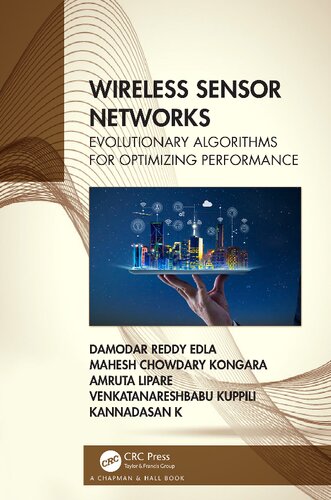

Most ebook files are in PDF format, so you can easily read them using various software such as Foxit Reader or directly on the Google Chrome browser.
Some ebook files are released by publishers in other formats such as .awz, .mobi, .epub, .fb2, etc. You may need to install specific software to read these formats on mobile/PC, such as Calibre.
Please read the tutorial at this link: https://ebookbell.com/faq
We offer FREE conversion to the popular formats you request; however, this may take some time. Therefore, right after payment, please email us, and we will try to provide the service as quickly as possible.
For some exceptional file formats or broken links (if any), please refrain from opening any disputes. Instead, email us first, and we will try to assist within a maximum of 6 hours.
EbookBell Team

4.8
94 reviewsWireless Sensor Networks: Evolutionary Algorithms for Optimizing Performance provides an integrative overview of bio-inspired algorithms and their applications in the area of Wireless Sensor Networks (WSN). Along with the usage of the WSN, the number of risks and challenges occurs while deploying any WSN. Therefore, to defeat these challenges some of the bio-inspired algorithms are applied and discussed in this book.
Discussion includes a broad, integrated perspective on various challenges and issues in WSN and also impact of bio-inspired algorithms on the lifetime of the WSN. It creates interdisciplinary theory, concepts, definitions, models and findings involved in WSN and Bio-inspired algorithms making it an essential guide and reference. It includes various WSN examples making the book accessible to a broader interdisciplinary readership.
The book offers comprehensive coverage of the most essential topics, including:
The book explains about practices of shuffled complex evolution algorithm, shuffled frog leaping algorithm, particle swarm optimization and dolphin swarm optimization to defeat various challenges in WSN. The author elucidates how we must transform our thinking, illuminating the benefits and opportunities offered by bio-inspired approaches to innovation and learning in the area of WSN. This book serves as a reference book for scientific investigators who shows an interest in evolutionary computation and swarm intelligence as well as issues and challenges in WSN.